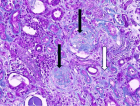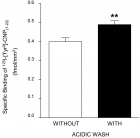Abstract
Research Article
Cognition and Memory Impairment among Patients of Depression in Pakistan-The Role of Conventional and Newer Anti-Depressants
Madeeha Malik*, Muhammad Usama Khan, Azhar Hussain and Ayisha Hashmi
Published: 17 July, 2019 | Volume 3 - Issue 1 | Pages: 020-024
Background: Antidepressant therapy is the most adopted treatment option for depression. The evaluation of cognitive effects related to antidepressant drug use is important for better selection of antidepressant drugs that leads to improved cognitive performance and patient health related quality of life. Aim: The aim of the present study was to evaluate the effects of antidepressant drugs on cognition and memory among patients of depression in Pakistan.
Method: A descriptive cross-sectional study design was used. A pre-validated data collection tool Mini Mental State Examination was used. The sample size was calculated to be 382 with 95% confidence interval and 5% level of error. The data was cleaned, coded and analyzed statistically using spss 21. Chi-Square test (p ≥ 0.05) was used to find association among different variables.
Results: The results showed that out of 382 respondents, 7.3% (n=28) were being prescribed amytryptyline and among them 46% (n=13) had questionably significant cognitive impairment and 53% (n=15) had mild cognitive impairment. On the other hand out of 23% (n=89) patients on escitalopram monotherapy, 85% (n=76) had impairment of questionably significant impairment and only 13.4% (n=12) had mild impairment. Area of residence and medication therapy were significant variables (p<0.05) that can affect cognition and memory among patients of depression.
Conclusion: The results of present study concluded cognitive impairment of questionably significant nature among patients of depression in Pakistan. For the better management of depression, it is recommended that anti-depressant drug therapy should be tailored according to individual patient requirements.
Read Full Article HTML DOI: 10.29328/journal.apmh.1001006 Cite this Article Read Full Article PDF
References
- Reporters. 34 per cent Pakistanis suffer from depression. The Nation. 2012.
- Organization WH. WHO Depression Fact Sheet (updated February 2017). 2017.
- Duthey B. Priority medicines for europe and the world:“a public health approach to innovation”. WHO Background paper. 2013; 6.
- Soczynska JK, Ravindran LN, Styra R, McIntyre RS, Cyriac A, et al. The effect of bupropion XL and escitalopram on memory and functional outcomes in adults with major depressive disorder: results from a randomized controlled trial. Psychiatry research. 2014; 220: 245-50. PubMed: https://www.ncbi.nlm.nih.gov/pubmed/25124683
- Reddy S, Fayyad R, Edgar CJ, Guico-Pabia CJ, Wesnes K. The effect of desvenlafaxine on cognitive functioning in employed outpatients with major depressive disorder: a substudy of a randomized, double-blind, placebo-controlled trial. Journal of Psychopharmacology. 2016; 30: 559-67. PubMed: https://www.ncbi.nlm.nih.gov/pubmed/27009044
- Koenig HG, Al Zaben F, Sehlo MG, Khalifa DA, Al Ahwal MS. et al. Mental health care in Saudi Arabia: Past, present and future. Open Journal of Psychiatry. 2014; 4: 113.
- Noh S, Kaspar V. Perceived discrimination and depression: Moderating effects of coping, acculturation, and ethnic support. American journal of public health. 2003; 93: 232-8. PubMed: https://www.ncbi.nlm.nih.gov/pmc/articles/PMC1447722/
- Airaksinen E, Larsson M, Lundberg I, Forsell Y. Cognitive functions in depressive disorders: evidence from a population-based study. Psychological medicine. 2004; 34: 83-91. PubMed: https://www.ncbi.nlm.nih.gov/pubmed/14971629
- Kessler RC. Epidemiology of women and depression. Journal of affective disorders. 2003; 74: 5-13. PubMed: https://www.ncbi.nlm.nih.gov/pubmed/12646294
- Ganatra HA, Zafar SN, Qidwai W, Rozi S. Prevalence and predictors of depression among an elderly population of Pakistan. Aging and Mental Health. 2008; 12: 349-56. PubMed: https://www.ncbi.nlm.nih.gov/pubmed/18728948
- Everson SA, Maty SC, Lynch JW, Kaplan GA. Epidemiologic evidence for the relation between socioeconomic status and depression, obesity, and diabetes. Journal of psychosomatic research. 2002;53(4):891-5.PubMed: https://www.ncbi.nlm.nih.gov/pubmed/12377299
- Patel V, Rodrigues M, DeSouza N. Gender, poverty, and postnatal depression: a study of mothers in Goa, India. American journal of Psychiatry. 2002; 159: 43-7. PubMed: https://www.ncbi.nlm.nih.gov/pubmed/11772688
- Rosenblat JD, Kakar R, McIntyre RS. The cognitive effects of antidepressants in major depressive disorder: a systematic review and meta-analysis of randomized clinical trials. International Journal of Neuropsychopharmacology. 2016; 19. PubMed: https://www.ncbi.nlm.nih.gov/pubmed/26209859
- Greer TL, Sunderajan P, Grannemann BD, Kurian BT, Trivedi MH. Does duloxetine improve cognitive function independently of its antidepressant effect in patients with major depressive disorder and subjective reports of cognitive dysfunction? Depression research and treatment. 2014; 2014.
Similar Articles
-
Comparison of Cardiovascular Risks following Smoking Cessation Treatments Using Varenicline vs. NRT among Schizophrenic SmokersSusan Abughosh*,I-Hsuan Wu,Hua Chen,Ekere James Essien,Michael Johnson,Patrick Bordnick2,Ronald J Peters. Comparison of Cardiovascular Risks following Smoking Cessation Treatments Using Varenicline vs. NRT among Schizophrenic Smokers. . 2017 doi: 10.29328/journal.apmh.1001001; 1: 001-010
-
Impact of four obesity interventions on biometric measures of individuals positive and negative for food addictionTrina Aguirre*,Leeza Struwe,Ann Koehler,Rebecca Kreman,Rebecca Bowman,Erica Schulte,Kayla Pierce,Molly Bloodgood,effrey Holloway. Impact of four obesity interventions on biometric measures of individuals positive and negative for food addiction. . 2018 doi: 10.29328/journal.apmh.1001002; 2: 001-0005
-
Psychosocial care is necessary in supporting refugeesGudrun Widders*,Ute Teichert. Psychosocial care is necessary in supporting refugees. . 2018 doi: 10.29328/journal.apmh.1001003; 2: 006-008
-
Mental health promotion program in the workplace with focus on transportOlaf Jensen*,Fereshteh Baygi,George Charalambous,Agnes Flores,Lise Hedegaard Laursen,David Lucas,Debbie Andrioti. Mental health promotion program in the workplace with focus on transport. . 2019 doi: 10.29328/journal.apmh.1001004; 3: 001-011
-
Diseases of the mental sphere revealed by the psychiatrist at contingent of patients of the consultative outpatient admissionShapovalova LA*,Shapovalov КA. Diseases of the mental sphere revealed by the psychiatrist at contingent of patients of the consultative outpatient admission. . 2019 doi: 10.29328/journal.apmh.1001005; 3: 012-019
-
Cognition and Memory Impairment among Patients of Depression in Pakistan-The Role of Conventional and Newer Anti-DepressantsMadeeha Malik*,Muhammad Usama Khan,Azhar Hussain,Ayisha Hashmi. Cognition and Memory Impairment among Patients of Depression in Pakistan-The Role of Conventional and Newer Anti-Depressants. . 2019 doi: 10.29328/journal.apmh.1001006; 3: 020-024
-
Effectiveness of ethinyl oestradiol /cyproterone acetate and ethinyl oestradiol/ desogestrel with or without low-dose metformin on perceived health-related quality of life in hirsute women with polycystic ovary disease: A randomised, double-blind, placebo-controlled studySanjeewani Fonseka*,B Subhani,V Alahakoon,CN Wijeyaratne,IB Gawarammana,NS Kalupahana,N Ratnatunga,S Rosairo,PVR Kumarasiri. Effectiveness of ethinyl oestradiol /cyproterone acetate and ethinyl oestradiol/ desogestrel with or without low-dose metformin on perceived health-related quality of life in hirsute women with polycystic ovary disease: A randomised, double-blind, placebo-controlled study. . 2019 doi: 10.29328/journal.apmh.1001007; 3: 025-031
-
A Belgian program to fight child maltreatment: The “SOS children” teamsSophie Dechêne*,Emmanuel de Becker. A Belgian program to fight child maltreatment: The “SOS children” teams. . 2019 doi: 10.29328/journal.apmh.1001008; 3: 032-041
-
Microchimerism may be the cause of psychiatric disordersOsman Demirhan*,Bülent Demirbek. Microchimerism may be the cause of psychiatric disorders. . 2019 doi: 10.29328/journal.apmh.1001009; 3: 042-046
-
Transference and countertransference are linked to placebo-nocebo effects and they are an auxiliary resource of unparalleled value in general medicine: Recommendations for general practitionersJose Luis Turabian*. Transference and countertransference are linked to placebo-nocebo effects and they are an auxiliary resource of unparalleled value in general medicine: Recommendations for general practitioners. . 2020 doi: 10.29328/journal.apmh.1001010; 4: 001-006
Recently Viewed
-
Outpatient operative hysteroscopy: evaluation of patient satisfaction and acceptanceClare Margaret Crowley*,Noelle Gill,Minna Geisler. Outpatient operative hysteroscopy: evaluation of patient satisfaction and acceptance. Clin J Obstet Gynecol. 2022: doi: 10.29328/journal.cjog.1001098; 5: 005-008
-
Predictors of positive treatment response to PTNS in women with overactive bladderSuneetha Rachaneni*,Doyo Enki,Megan Welstand,Thomasin Heggie,Anupreet Dua. Predictors of positive treatment response to PTNS in women with overactive bladder. Clin J Obstet Gynecol. 2022: doi: 10.29328/journal.cjog.1001097; 5: 001-004
-
Prediction of neonatal and maternal index based on development and population indicators: a global ecological studySedigheh Abdollahpour,Hamid Heidarian Miri,Talat Khadivzadeh*. Prediction of neonatal and maternal index based on development and population indicators: a global ecological study. Clin J Obstet Gynecol. 2021: doi: 10.29328/journal.cjog.1001096; 4: 101-105
-
A Genetic study in assisted reproduction and the risk of congenital anomaliesKaparelioti Chrysoula,Koniari Eleni*,Efthymiou Vasiliki,Loutradis Dimitrios,Chrousos George,Fryssira Eleni. A Genetic study in assisted reproduction and the risk of congenital anomalies. Clin J Obstet Gynecol. 2021: doi: 10.29328/journal.cjog.1001095; 4: 096-100
-
Leiomyosarcoma in pregnancy: Incidental finding during routine caesarean sectionToon Wen Tang*,Phoon Wai Leng Jessie. Leiomyosarcoma in pregnancy: Incidental finding during routine caesarean section. Clin J Obstet Gynecol. 2021: doi: 10.29328/journal.cjog.1001094; 4: 092-095
Most Viewed
-
Evaluation of Biostimulants Based on Recovered Protein Hydrolysates from Animal By-products as Plant Growth EnhancersH Pérez-Aguilar*, M Lacruz-Asaro, F Arán-Ais. Evaluation of Biostimulants Based on Recovered Protein Hydrolysates from Animal By-products as Plant Growth Enhancers. J Plant Sci Phytopathol. 2023 doi: 10.29328/journal.jpsp.1001104; 7: 042-047
-
Sinonasal Myxoma Extending into the Orbit in a 4-Year Old: A Case PresentationJulian A Purrinos*, Ramzi Younis. Sinonasal Myxoma Extending into the Orbit in a 4-Year Old: A Case Presentation. Arch Case Rep. 2024 doi: 10.29328/journal.acr.1001099; 8: 075-077
-
Feasibility study of magnetic sensing for detecting single-neuron action potentialsDenis Tonini,Kai Wu,Renata Saha,Jian-Ping Wang*. Feasibility study of magnetic sensing for detecting single-neuron action potentials. Ann Biomed Sci Eng. 2022 doi: 10.29328/journal.abse.1001018; 6: 019-029
-
Pediatric Dysgerminoma: Unveiling a Rare Ovarian TumorFaten Limaiem*, Khalil Saffar, Ahmed Halouani. Pediatric Dysgerminoma: Unveiling a Rare Ovarian Tumor. Arch Case Rep. 2024 doi: 10.29328/journal.acr.1001087; 8: 010-013
-
Physical activity can change the physiological and psychological circumstances during COVID-19 pandemic: A narrative reviewKhashayar Maroufi*. Physical activity can change the physiological and psychological circumstances during COVID-19 pandemic: A narrative review. J Sports Med Ther. 2021 doi: 10.29328/journal.jsmt.1001051; 6: 001-007

HSPI: We're glad you're here. Please click "create a new Query" if you are a new visitor to our website and need further information from us.
If you are already a member of our network and need to keep track of any developments regarding a question you have already submitted, click "take me to my Query."

















































































































































